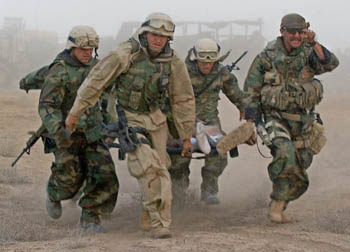"When we send them off to do the nation's bidding in a place like Afghanistan or Iraq and they're wounded, we're not returning the same individual," [Marine Lt. Gen.] Amos said. "When we send them back wounded there is a piece of me that says I haven't kept my bargain. What's left for me to do is to continue taking care of them." [source]It's left to more than generals to continue taking care of them. It's left to all of us. I'll never forget talking to my mother at the moment I saw President Bush speaking on television in September 2001 as he made it clear there would be war with Afghanistan. As I considered what our soldiers were likely already doing for us over there, I was filled with a sense of undeserving, of horror that we were asking them to do something for us that would have them return changed in mind and sometimes body. I exclaimed that nothing we could do would ever compensate them for that loss of innocence or mangled flesh. Through her tears, she said, "That's why we must do everything we can to take care of them and their families... for the rest of their lives. We owe it to them."
As I have written before, we cannot go back and change a death that occurred on the battlefield. We can hold their memory in our hearts and forever honor those who have died with what we make of their gift, but it is the living that need us now.Visiting officers played with their 5-year-old son and 3-year-old daughter in the hospital's rehab gym, where Claude, whose leg was mangled by a roadside bomb, is learning to walk again - so he can return to duty with a prosthetic limb.
Returning himself to Camp Lejeune after the trip, Amos summed up:
"We bury our dead with great honor and dignity, but the wounded live on. They are the ones we as Americans should not forget."
One portion of the living is those who gave as close to all as possible but still returned to us. They face a long road of struggle with various degrees of recovery possible. They are our present... and with the proper care and support they will become our future--people of courage and character, tried by fire and knowing by experience how to persevere and what really matters.
Not all of us are cut out to do the kind of personal visits that Lt. Gen. Amos does. But we can each find our own ways to help. The way I help is through Valour-IT, which provides voice-controlled laptops to those who can't use standard keyboards due to their wounds. Soldiers' Angels also offers you the opportunity to write letters to wounded warriors, supply basic comfort items to patients just off the battlefield in the hospital at Landstuhl, or sew blankets and special mittens and booties that cover bulky casts and medical devices in order to keep the wounded warm during the cold plane ride that brings them back to the U.S.
When I shared the article about Lt. Gen. Amos with someone who has a great deal of expertise in leadership and management, her instant reply was, "What a leader!" Yes. And like any good leader, Amos is leading by example. Will you follow?
So do we."It's a function of loyalty," the 59-year-old general said. "In Marine speak, it means fidelity. It's a wonderful word not used very often - except in the Marine Corps. It means faithful. It implies faithful almost to a fault...
"I owe it to them."









